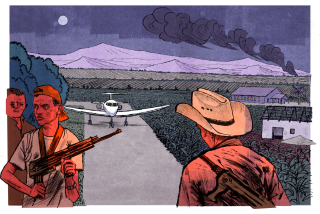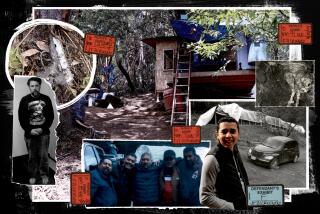Seven Assailed for Illegal Plan to Save Property Held for Decades by Family : Farmers Who Grew Pot to Pay Off Debts Now Face Town’s Ire
- Share via
FT. BENTON, Mont. — Faced with the prospect of losing the grain farm that has been in their family for most of this century, seven members of the Richard Kurth family turned to a new cash crop--marijuana.
That decision, discovered in a drug bust last fall, has turned many in this farm town of 1,700 against the Kurths. Some see no end to the controversy, particularly after most of the family received reduced sentences.
“I don’t believe they will ever be able to live in the community again,” said Joan Stewart, editor of The River Press newspaper. “It’s never going to be forgotten.”
Still Face Foreclosure
Yet some of the Kurths say all they want to do is remain on the 4,500-acre farm and cattle feedlot, which still faces foreclosure.
“I’m not going to let a community shove me out,” said Cindy Halley, daughter of Richard Kurth, the family patriarch.
It’s not just the family’s action that has upset Ft. Benton. About 960 valid signatures, far more than the 549 needed, have been gathered on a petition to recall Chouteau County Prosecutor Tom Sheehy over the way the case was handled.
“This type of prosecution will only encourage more drug traffic,” says the petition, which expresses concern over plea bargaining and notes that the Kurths were not required to post bond.
“This ‘prominent’ family has never paid a cent of bail, they weren’t brought in,” complained Winnie Appleby, who runs a local motel.
‘He Was Inexperienced’
Dr. William Gertson, heading the recall effort, said people wanted Sheehy to turn the case over to federal prosecutors “because we felt like he was inexperienced and we felt like he was so liberal that nothing would happen.”
The prosecutor, who is suing to invalidate the recall petitions, defended the plea bargains that resulted in convictions of Richard Kurth and his wife, Judy, both 57, and five others.
“Guilty is guilty,” Sheehy said.
He noted that District Judge Chan Ettien released the family members on their own recognizance and reduced sentences that Sheehy recommended.
Richard Kurth received four concurrent 20-year sentences, with all but five years suspended, while his wife received a five-year sentence with all but one year suspended. Both could be out in less than a year, with good behavior. Sentences for the others were suspended altogether or deferred.
Discounts Social Impact
Ettien struck a nerve with his courtroom comment that the social ill from marijuana use “does not approach that of alcohol.”
The judge, who declined to elaborate, wrote in his sentencing order that, except for one criminal offense, the Kurths had been “an exemplary group.”
Some people in town agree. Howard Axtman, who sells farm equipment and had two Kurth children in his Boy Scout troop, said: “I’m not a supporter of what they did. I don’t think anyone is. But they were good people.”
Up to a point, they were typical people too.
Most farmers in Montana have suffered years of drought and low prices for grain.
But in 1985, Richard and Judy Kurth decided that to pay their debts they would grow marijuana. They have said the decision stemmed from an offhand remark made by an officer of Norwest Bank in Great Falls.
Bank Officer’s Suggestion
“Perhaps in jest, perhaps not,” the bank officer suggested they could save their ranch only by “growing an illegal cash crop of some sort, perhaps marijuana,” defense lawyer Ralph Randono said at the couple’s sentencing.
He contended that the bank was “very aware” of what the Kurths were doing.
Frank Shaw, president of the bank, termed the comments “preposterous and total fabrications.”
After beginning the operation, the couple decided to recruit their adult children. All three agreed, along with two of their spouses; son Bill Kurth’s wife, Lisa, was not involved, authorities said.
“Kind of the way I took it was either you hop on the bandwagon and help out or I guess you can just go down the road and find another job,” said son-in-law Clay Halley, “because it was either do this and save the ranch or there wasn’t going to be any ranch.”
Sold $400,000 Worth
In nearly two years, authorities say the family sold $400,000 worth of marijuana.
In addition to the sentences, the state is seeking $750,000 in taxes and interest, based on the estimated value of the 2,155 marijuana plants seized in last October’s raid.
Family members had a lot to learn about growing marijuana, they said in a recent interview. First, they went to libraries and bookstores. They also received advice from customers, lost some crops and learned from mistakes.
“Just like anything else in agriculture, you try it and if it doesn’t work, you change it and try it again,” Clay Halley said.
Hired men and customers came and went at the farm, 14 miles south of Ft. Benton, without knowing that marijuana was being grown and dried in four separate buildings with automatic watering and lighting systems. Windows and doors in those buildings were locked and covered.
Served Papers on Debts
Even sheriff’s deputies, serving papers involving the Kurths’ debts, had no reason to suspect anything, said Undersheriff Doug Williams.
The loan agreement showed Norwest Bank had agreed to forgive the Kurths’ $1.3-million loan if they paid $275,000. They paid $125,000 and hoped to make the final payments by April, 1988, then restructure their debts with the Federal Land Bank, save the farm and stop growing marijuana.
“Our objective was to not continue this thing over two years, and when we got done in two years, to still have a ranch,” said son Doug Kurth.
Just 5 1/2 months before the last loan payment was due, federal and county law officers arrived at the Kurth property, after receiving a tip.
Attempted Robbery
The Kurths say they were actually relieved to see law officers pull up on Oct. 18. Two days earlier, men posing as Drug Enforcement Administration agents had attempted a robbery. The following day, they had received a $25,000 extortion demand.
But they have since had to face their own young children, deal with publicity and withstand the continued scrutiny of their neighbors and the townspeople.
The family’s clothing, cars, travel and entertainment are often discussed, and many people maintain the Kurths could have altered a life style described as “high-flying” if they had truly wanted to get out of debt.
“They lived so much higher than people who were in debt,” said Gertson. “They were flashy in their dress, flashy in their way of living.”
And editor Stewart said of Richard Kurth, “His life style is not poor farmer, and never has been.”
Doug Kurth and his wife, Rhonda, and the Halleys say such talk is a price they pay for living in a small town. Despite it all, the two families want to remain.
Doug summed up the message he’d like to convey to the community, saying: “Hey, it’s over with. We’re paying our debt to society. Leave us alone.”
More to Read
Sign up for Essential California
The most important California stories and recommendations in your inbox every morning.
You may occasionally receive promotional content from the Los Angeles Times.










